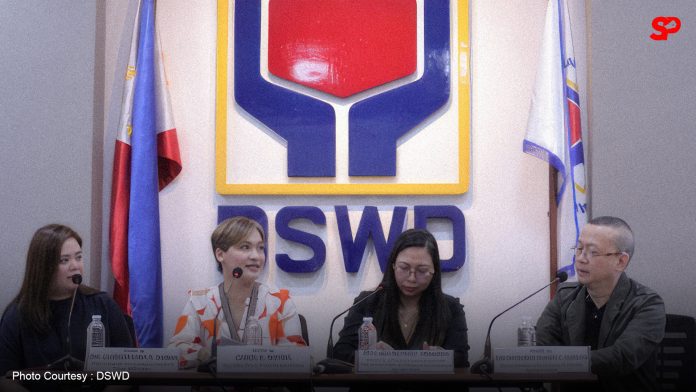MANILA – The Department of Social Welfare and Development (DSWD) has assisted 12, 055 individuals who were victim-survivors of violence against women and their children (VAWC) from 2021 to 2023, a senior social worker of the agency said on Thursday.
“Para sa Republic Act (RA) 9262 or the Anti-VAWC Act of 2004, sinasabi sa batas na ito na dapat kinikilala natin ang karapatan ng mga biktima ng karahasan. Dahil dito, dapat natin silang bigyan ng naaayon, available, at accessible services (Under RA 9262, we must promote the rights of the victims of violence. Because of this, we must provide them with proper, available and accessible services),” Social Welfare Officer Carol Nuyda told reporters during the DSWD Thursday Media Forum at its central office in Quezon City.
Nuyda said the DSWD provided comprehensive assistance to survivors of violence through the Residential and Non-Residential Care Services, the Recovery and Reintegration Program for Trafficked Persons (RRPTP), and various community-based services.
The agency’s interventions include psychosocial care or counseling; psychological or psychiatric testing; provision of professional health services; referral for medico-legal examinations; and mechanisms for protection against mental, emotional, physical, and sexual abuse, as well as other forms of exploitation.
Nuyda said the DSWD also provides clothing and personal items, offers legal and paralegal assistance, and facilitates referrals or transfers to local government units (LGUs) or registered and licensed private residential care facilities for temporary shelter or proactive custody.
VAW is defined as “any act or a series of acts committed by any person against a woman which resulted or is likely to result in physical, sexual, psychological harm or suffering, or economic abuse including threats of such acts, battery, assault, coercion, harassment or arbitrary deprivation of liberty.”
Nuyda said a woman can be considered a victim if she is the perpetrator’s wife, former wife, or if she has had a sexual or dating relationship with the perpetrator.
The same applies to any woman sharing a child with the perpetrator, regardless of whether the child is legitimate or illegitimate, and irrespective of their living situation, according to the DSWD social worker.
She said the press briefing on VAW is one of the initiatives of the DSWD to raise awareness and promote the agency’s programs and services for victim-survivors of VAWC as part of the 18-day campaign to end violence against women.
“We have this campaign to address the root causes of VAW. Bakit po naka-focus sa VAW (Why is it focused on VAW)? It is because of the patriarchal order of the society despite the modernization that we have… Because of this unequal status in the society, masasabi po natin na nasa disadvantaged position ang kababaihan kaya mas nangangailangan sila ng (we can say that women are in a disadvantaged position, that’s why they need enhanced) protection and responses from the government,” Nuyda said.
‘Break the silence’
In the same forum, a senior DSWD official urged the public, particularly survivors of violence against women and children (VAWC), to report instances of abuse to relevant authorities so proper action can be taken.
“Marami pong unreported pa rin hanggang ngayon kaya natin tinitibag ang culture of silence ng ating mga biktima. Magsalita po kayo para matulungan namin kayo (There are many unreported incidents up to now, that’s why we are breaking the culture of silence among the victims. Speak out so we can help you),” said Director Aiza Riz Perez-Mendoza of the Office of the Undersecretary for International Affairs.
Mendoza said the government is taking necessary steps to encourage violence reporting by enhancing policies, making case reporting more accessible, and empowering more groups to apprehend the perpetrators.
“Ang mga programa natin ngayon ay towards breaking the culture of silence. Marami pong ginagawang programa ang mga ahensya ng gobyerno simula sa pagbaba nga mga VAW desks sa barangay, pagdagdag ng police visibility, pagdagdag ng power sa mga (Our programs now are geared towards breaking the culture of silence. Various agencies of government have programs, like establishing VAW Desks in barangays, enhanced police visibility, and empowering the) public utility vehicle drivers, security guards,” she said.
Mendoza said victim-survivors of VAWC can contact DSWD for appropriate interventions and services, and the agency may refer those seeking legal assistance to organizations that provide free legal services.
Nuyda said the agency is also offering counseling services to perpetrators to help prevent the use of violence.
“Sa programang ito, itinuturo natin kung papaano ba maaayos at ma-manage ng isang lalaki yung kanyang anger or outburst without using violence. Tinuturuan natin sila ng (Under the program, we teach men how to manage their anger or outburst without using violence. We teach them in the) unlearning of old ways of using violence and using positive masculinity,” she said.
Nuyda urged individuals to break their silence and encouraged victims, witnesses, or anyone with knowledge of abuse cases to seek help and report them.
The public may report VAWC cases through the National Emergency Hotline at 911, the Aleng Pulis Hotline at 0919-777-7377 or 0966-725-5961, and the nearest Barangay VAW Desk and Philippine National Police (PNP) Women and Children Protection Desk.
“Kung mayroon po tayong kakilala, kamag-anak, kaibigan, o kung tayo mismo ang nakaranas ng pang-aabuso, humingi po tayo ng tulong. Lahat po tayo ay may responsibility na tulungan ang kapwa natin, lalo na ang mga biktima ng VAWC (If we have acquaintances, relatives, friends or even you yourself, experienced abuse, seek help. All of us have the responsibility to help our fellow citizens, especially the victims of VAWC),” Nuyda said. (PNA)

